Updated: January 28, 2024.
Here is the list of 26 alternative search engines to Google.
Have you ever wanted to search for something online but felt like stepping away from Google?
This article is perfect for you. I’m going to introduce you to some of the best alternative search engines out there.
It’s generally understood that these alternative search engines might not offer the same level of quality and quantity as Google.
However, it can be quite educational and fun to experiment with these different search engines and analyze the results they come up with.
Let’s take a look at what’s available!

Why search engines other than Google?
Why consider search engines other than Google? While Google is the most commonly used search engine, there are several reasons to explore alternatives:
- Variety in Search Results: Different search engines can provide varied search results, offering a broader perspective and more diverse information. For example, a search engine like Bing might give different results for the same query compared to Google.
- Privacy-Focused Options: There are search engines like DuckDuckGo, Startpage, or Qwant that focus on user privacy and do not track or store personal data. This can be a significant consideration for those concerned about their online privacy.
- Specialization and Regional Focus: Some search engines specialize in certain areas or regions; Baidu is known for Chinese content, Yandex for Russian, and Ecosia is environmentally friendly, using its profits to plant trees.
- User Experience Preferences: Some users might prefer the interface, features, or ethos of other search engines. Exploring alternatives to Google can help find the best fit for individual search needs.
So, here’s the list of search engines other than Google. Let’s dive in!
Alternative search engines: the list
Here is the list of other search engines besides Google.
1. Alternative Search Engine: Bing
Link: Bing Search Engine

Bing, owned and operated by Microsoft, is the third-largest search engine in the world (the first one being, obviously, Google ad the second one being Baidu). Just like Google, Bing provides various services related to search, such as web, image, maps, shopping, and more.
Bing Image Search is an interesting image searching tool that presents images that are sharp, high-quality, and trending. You can also filter out the images according to different criteria including layout and size.
You can also view a tab containing related queries, over the results. Even Bing’s video search display is superior to YouTube’s and Google’s, where the results are presented and thumbnails and viewers can check out the videos without having to leave the SERPs.

⚡ Check my list of Bing search operators to learn how to perform advanced searches in Bing.
2. Alternative Search Engine: DuckDuckGo
Link: DuckDuckGo Search Engine
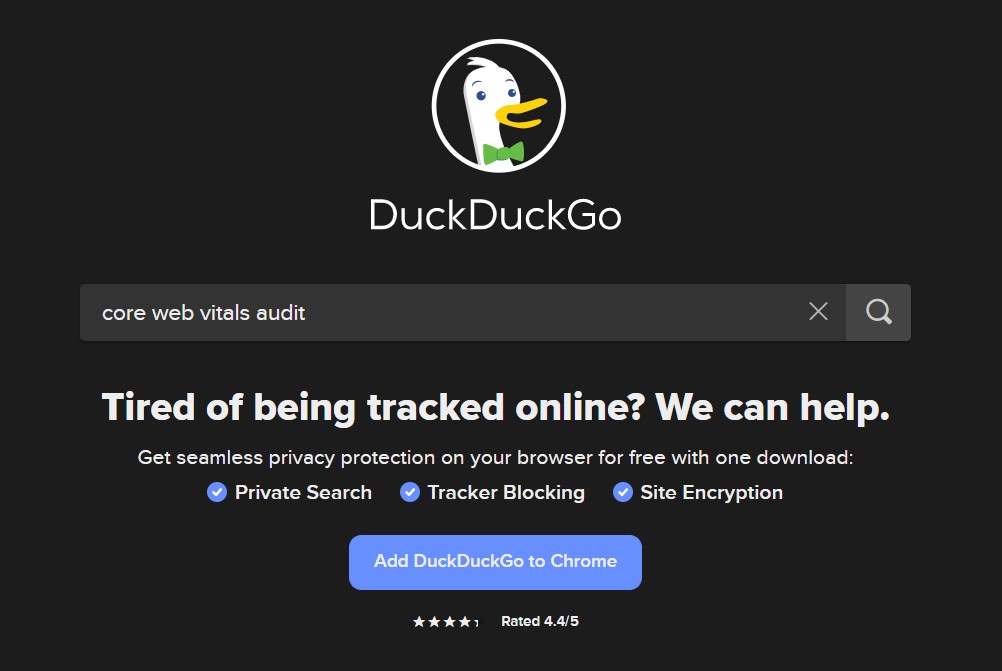
DuckDuckGo is one of the best options for users who might have concerns related to online privacy. This alternative to Google takes immense pride in not personalizing or tracking your results or searches. In fact, you can also benefit from useful visual guides related to filter bubbling and Google tracking.
An additional benefit for iOS users is that they can make DuckDuckGo their default Safari search engine. This option is also available in macOS Safari.
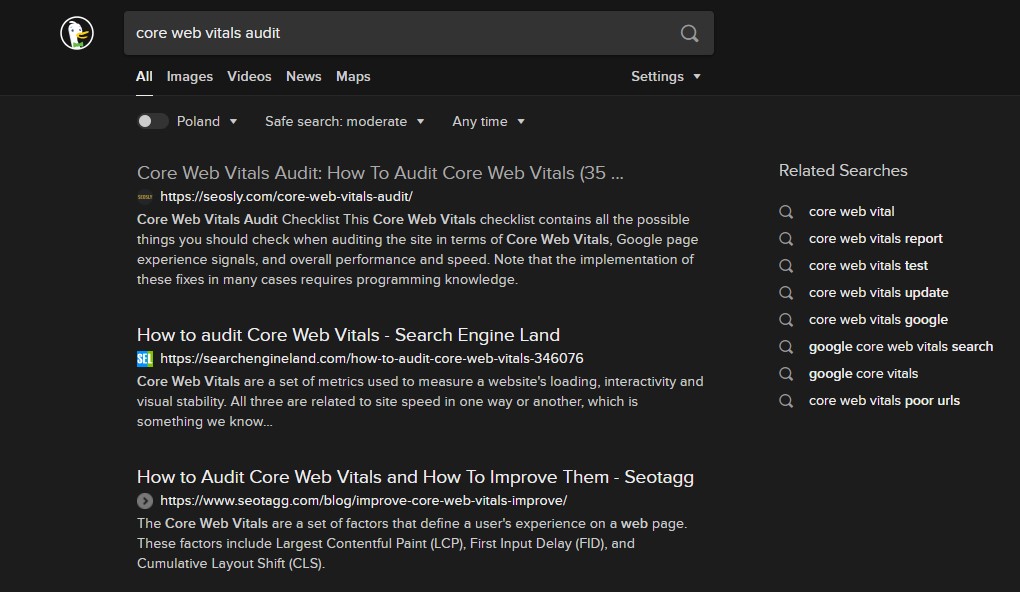
⚡ Check my list of the search engines that don’t track to discover more privacy search engines like DuckDuckGo.
3. Alternative Search Engine: Yandex
Link: Yandex
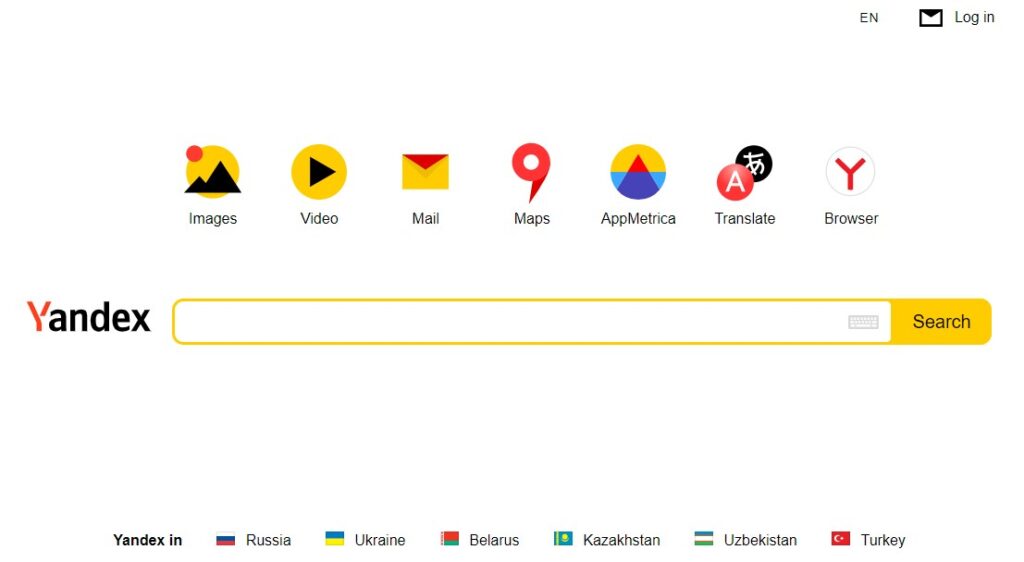
Yandex is a search engine that is similar to Google in that it offers free music, email, photo storage, traffic maps, and plenty of other features. These features were used by Google to lure users away from alternatives like Dropbox, Mapquest, and even Hotmail.
However, Google has been unable to do this in Russia because, in that country, the Yandex versions are very much comparable to Google and Yandex is still the most popular search engine there.

⚡ Check my list of Yandex search operators.
4. Alternative Search Engine: Baidu
Links: baidu.com (this search engine does not have a secure SSL connection)

With a penetration rate of 95%, Baidu is considered the largest search engine throughout China. Since the engine receives billions of new daily queries, business owners can be assured of excellent visibility via PPC ads.
Moreover, the platform will only charge you if your ad gets a click – no impression costs. Its popularity in China is down to the fact that, compared to Google, it has a much more profound understanding of the Chinese language.

5. Alternative Search Engine: Yahoo
Link: Yahoo Search

With Yahoo, users can benefit from organic results, and – relative to other search engines – it can provide improved shopping results. Also, the robust search engine can deliver information on almost any imaginable subject, while the message board allows you to view and participate in discussions on a wide range of topics.

6. StartPage
Link: Startpage Search Engine
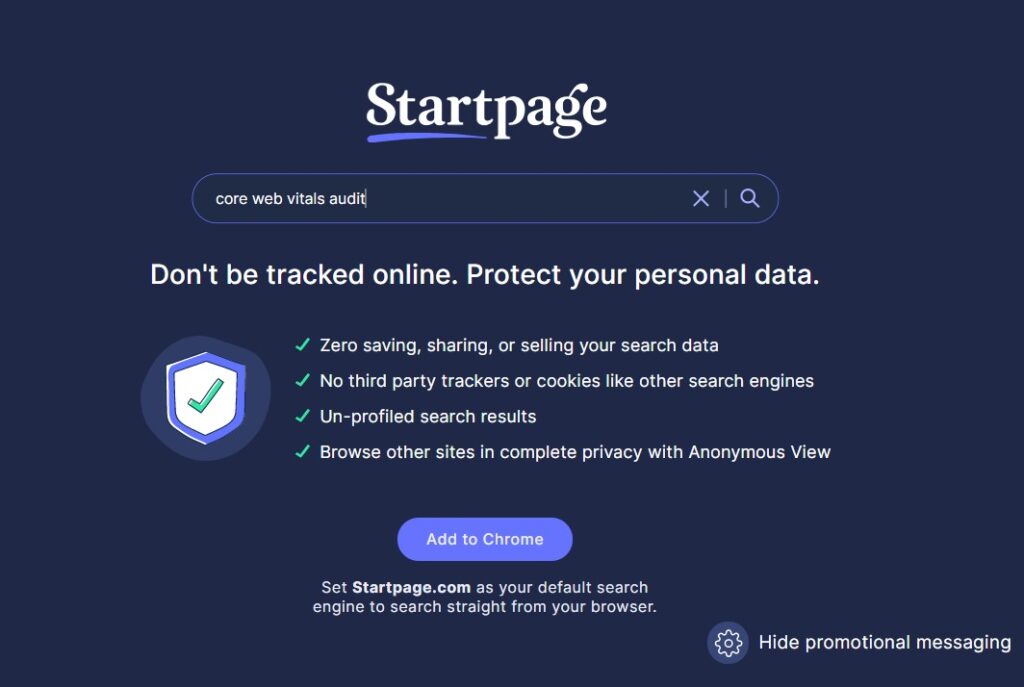
StartPage is a search engine belonging to the Netherlands and one that prides itself on its focus on privacy. With this engine, users can obtain search results that Google would have produced, but without compromising their privacy since StartPage does not save any search data or other personal information, nor does it add any trackers. There is no wonder then that StartPage claims to be “the most private search engine in the world”.
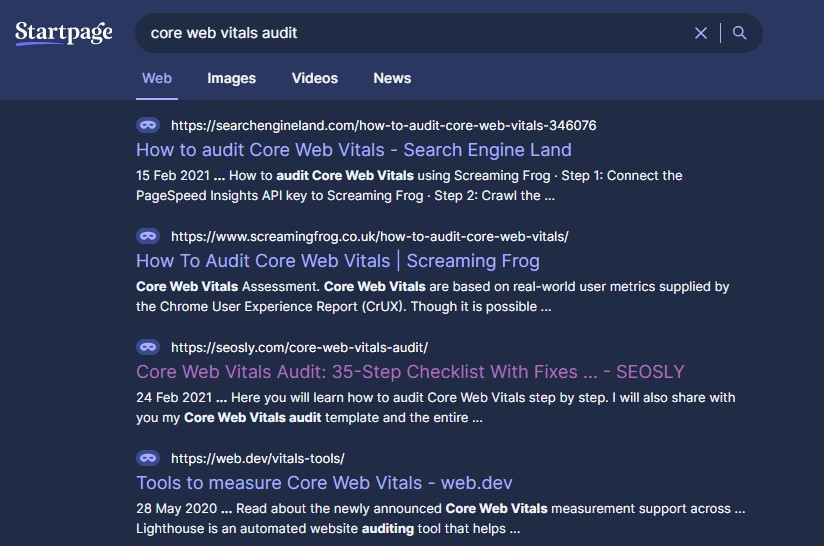
7. CC Search
Link: CC Search
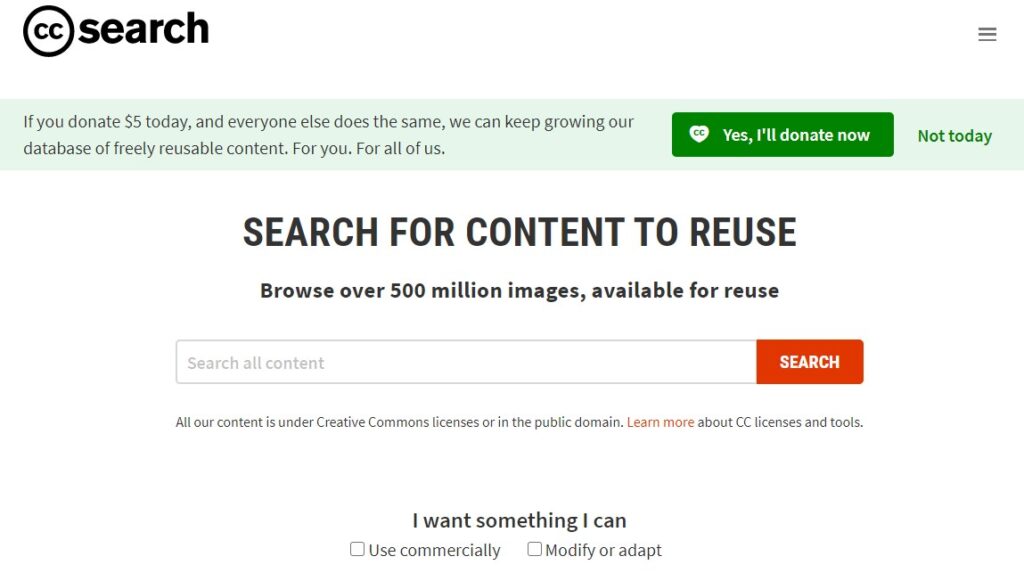
CC Search is a kind of tool that permits public and openly licensed domain works to be used and discovered by everyone. Creative Commons, the nonprofit responsible for CC Search, has prepared the CC licenses, which enable creators to share creativity and knowledge over the internet. As a creator, Creative Commons allows you to retain your copyright while encouraging your work to be used in certain ways.
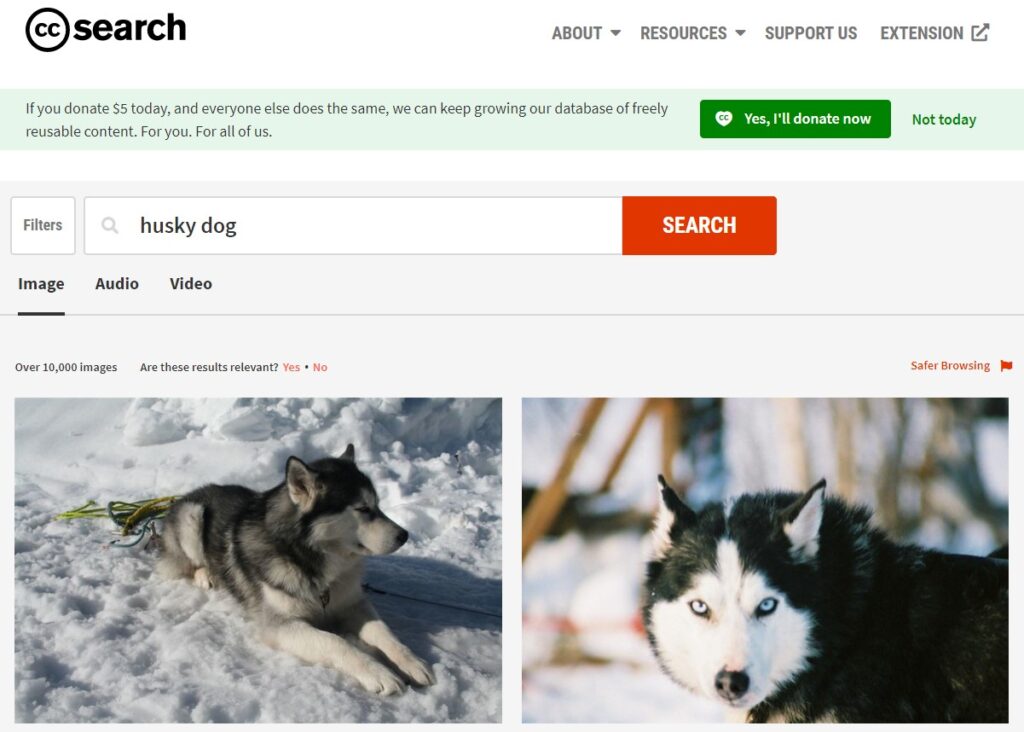
8. SwissCows
Link: SwissCows Search Engine
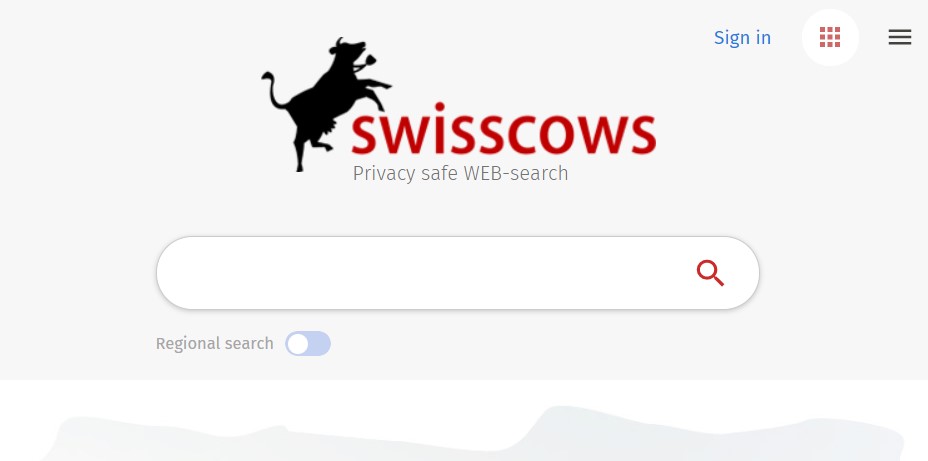
SwissCows is another one of the alternative search engines on this list with a special focus on protecting its users’ privacy. Not only will this search engine steer clear of saving any personal information, but it also lets you enjoy a distinct suggestion system that makes use of tags. SwissCows’ ad system works by targeting you based on your searches instead of through personal information. In addition, the platform also filters out any violent or pornographic results.

9. SearX
Link: Searx
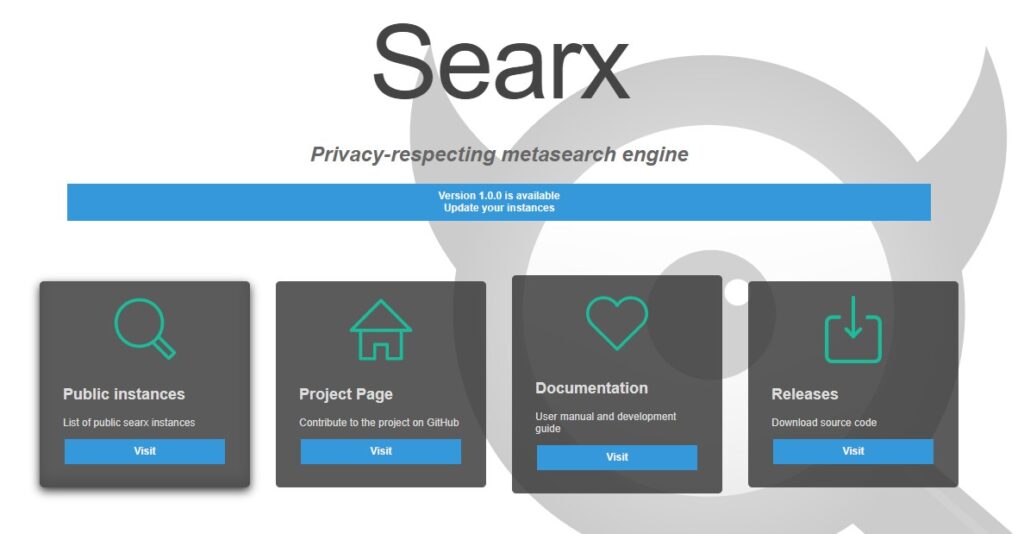
This free-of-cost metasearch engine also aims to respect and protect its users’ privacy. To achieve this objective, SearX does not share search histories or IP addresses with the search engines that it uses to obtain search results. In addition, it does not have any tracking cookies, nor will it implement any long-term tracking or logging. Also, since SearX uses multiple search engines to fetch results, you will be able to benefit from a far higher number of results.
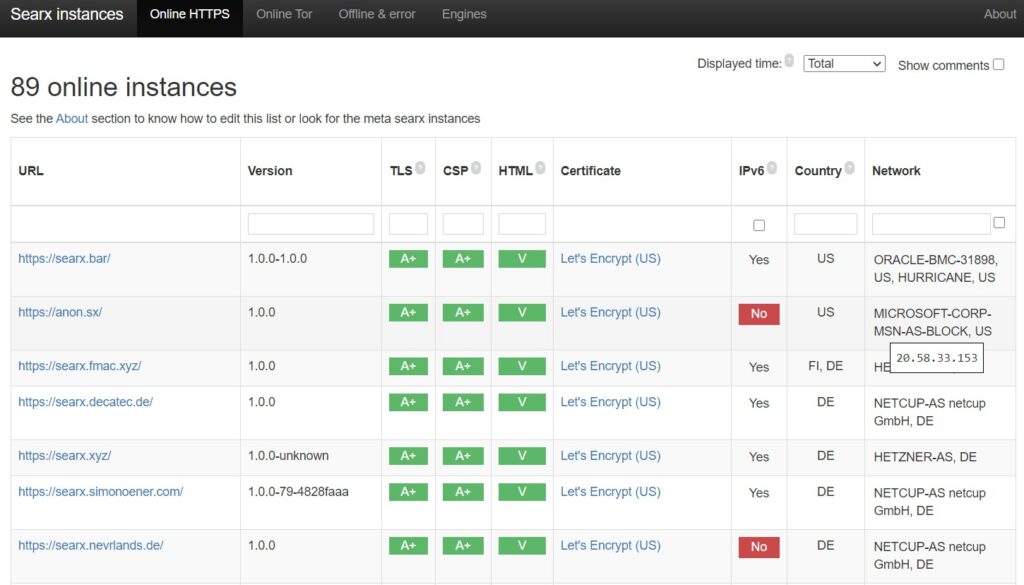
10. Gibiru
Link: Gibru Search Engine
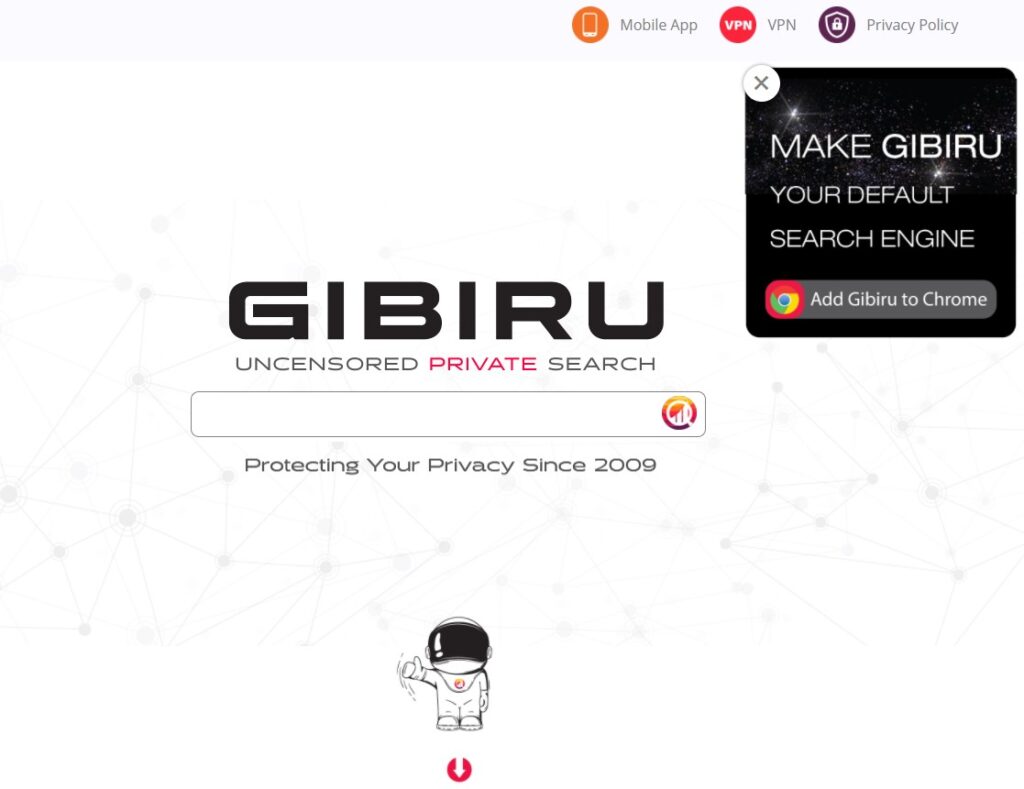
Gibiru’s revenue model is commission-based, which means that they will earn a certain percentage every time users answer a CTA or purchase something. In other words, it will not sell your personal information to earn money.
Moreover, Gibiru operates on a zero-retargeting policy, which means that you will not have to endure advertisements or solicitations for items that you have already bought. Since the platform does not store IP addresses or search histories, it will not have any data to sell to third parties.

11. Disconnect Search
Link: Disconnect Search
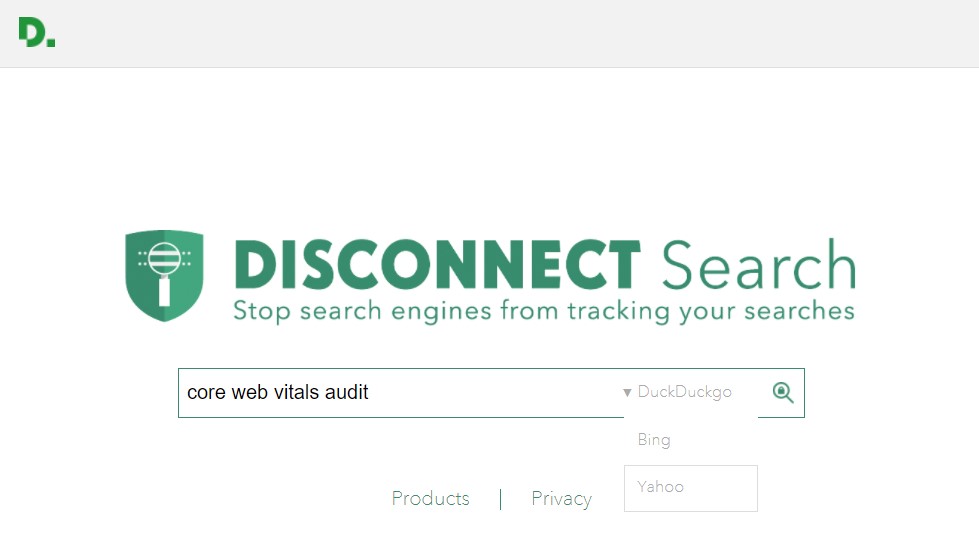
This specialized VPN enables users to make private searches through the search engine of their choice. Disconnect Search will not log IP addresses, searches, or any other private information. Search engines are capable of storing your searches and then connecting them to your actual name.
With Disconnect Search, you do not have to worry about this as this VPN lets you search anonymously. Blocking thousands of malware sites and trackers, Disconnect Search not only ensures your safety but also boosts the performance of your device.
I tried doing different searches with Disconnect Search and all ended up in DuckDuckGo no matter what search engines I chose in the dropdown menu.
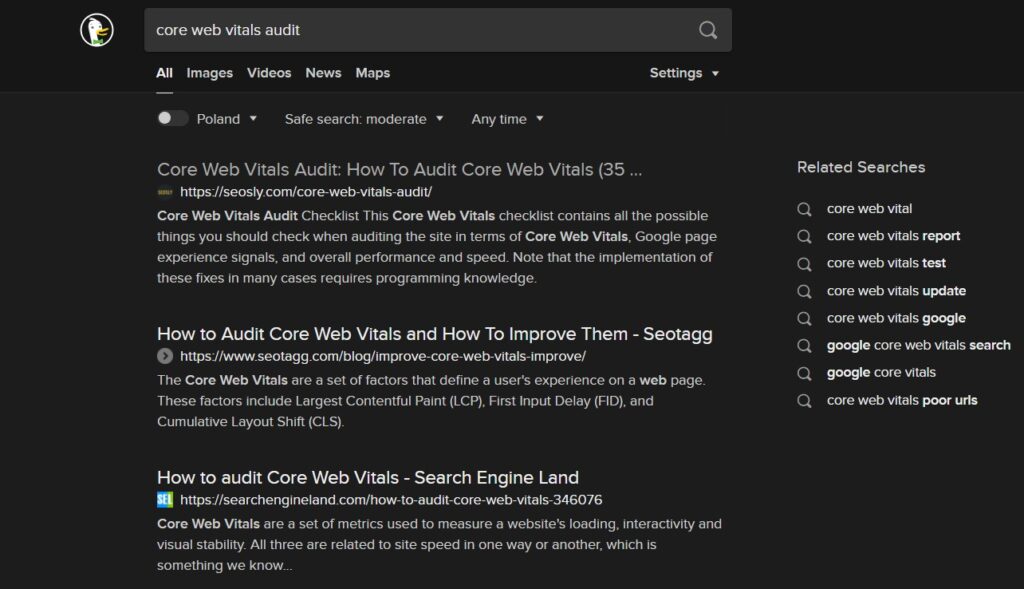
12. Lukol Search Engine
Link: Lukol

This is another alternative search engine that lets users search the internet without having to reveal or compromise their identity. This platform is driven by Google’s custom search, meaning that you can enjoy all the functionalities that come with Google along with the added benefit of anonymity and privacy protection, since Lukol does not track cookies, search terms, or IP addresses.

13. MetaGer Search
Link: MetaGer
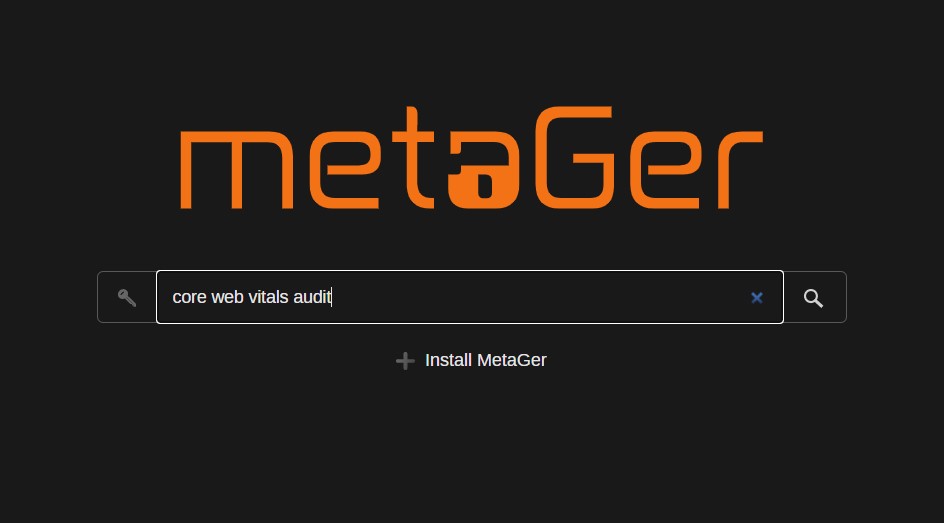
MetaGer is the most popular search engine across Germany, primarily since it allows free access to information without any sort of dictation or control through trusts or even the state. Moreover, the platform does not compromise its users’ privacy in any way and makes sure that there is no private data storage. Since MetaGer is a charitable organization, it does not need to use its users’ data or clicks to earn money.

14. Infinity Search
Link: Infinity Search
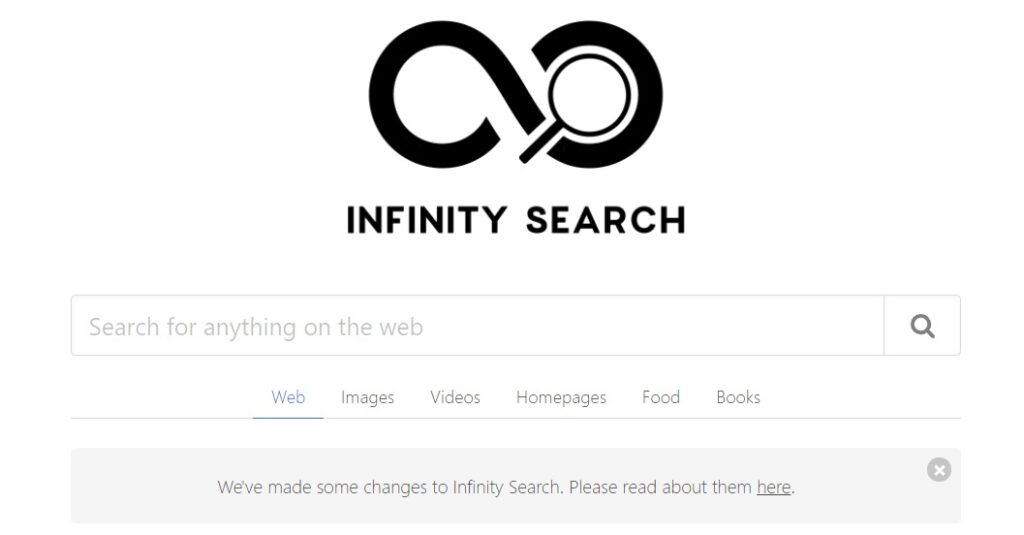
Based out of Tulsa, Oklahoma, this is another open-source alternative search engine, operating with the objective of making web surfing more easy and effective. When a user searches through Infinity Search, the website obtains results from multiple other search engines as well as from its own indexes, before organizing those results and delivering them to the user directly and without storing any information about them.
As you can see on the screenshot below, the Infinity Search has been updated and you need to pay to see the results.
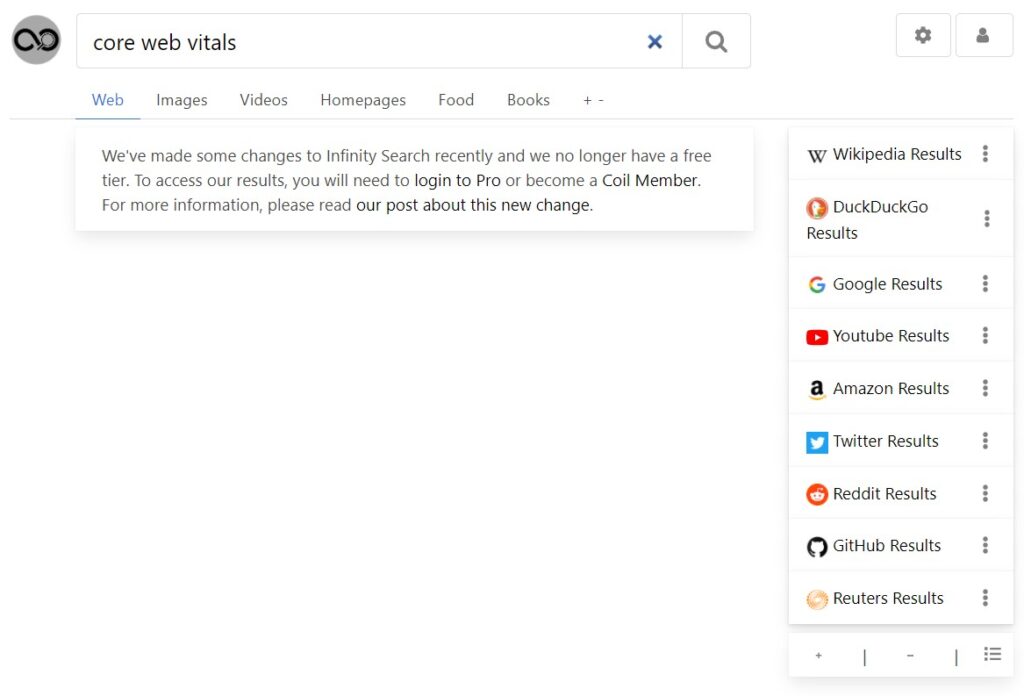
15. OneSearch
Link: OneSearch
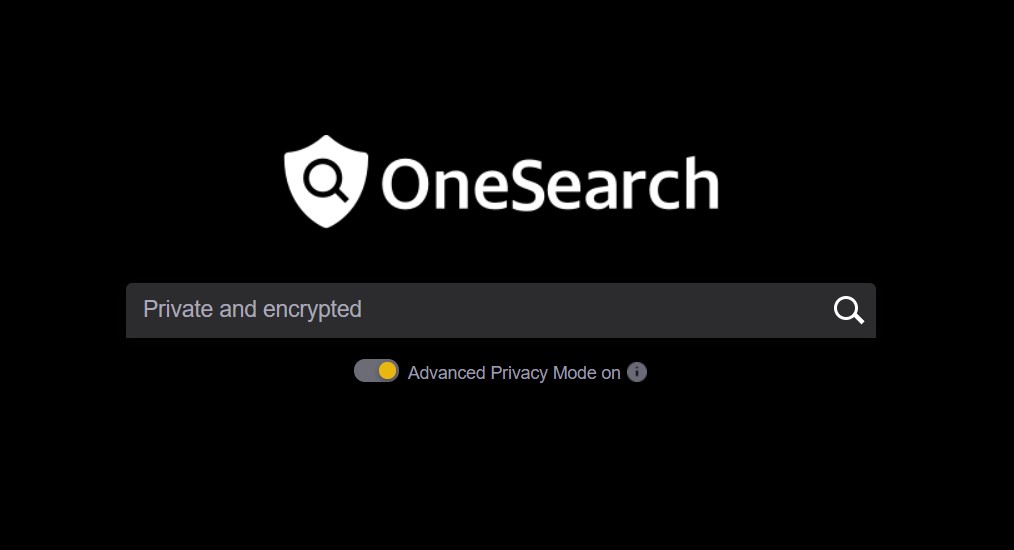
This quick and easy-to-use search engine lets users obtain relevant information on a number of topics through the collections in the Fogler Library. OneSearch is an excellent option for people looking for a search engine to research on books or scholarly journals. Even though it might not be a replacement for the Fogler Library’s databases, but, with its vast records of dissertations, theses, books, e-books, and newspaper articles, it is certainly a good place to start exploration on a topic.
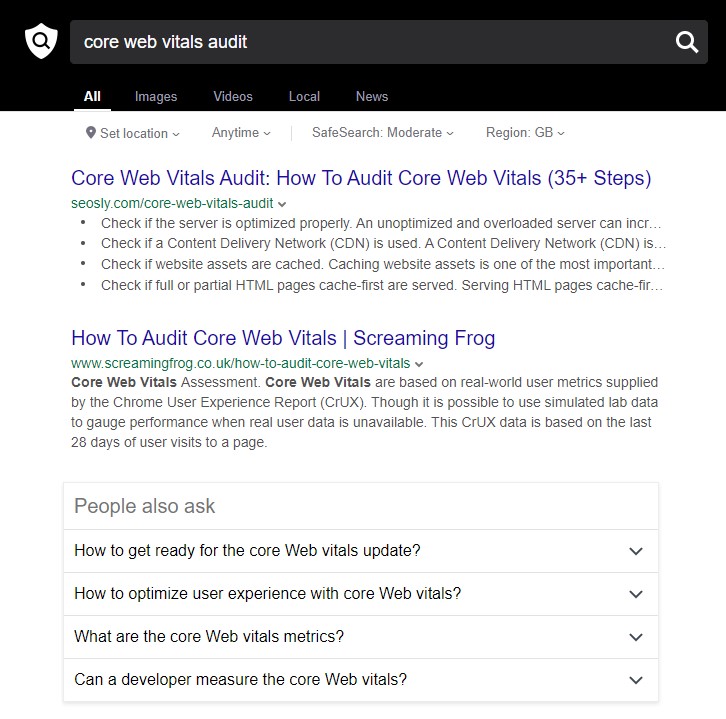
16. Qwant Search Engine
Link: Qwant
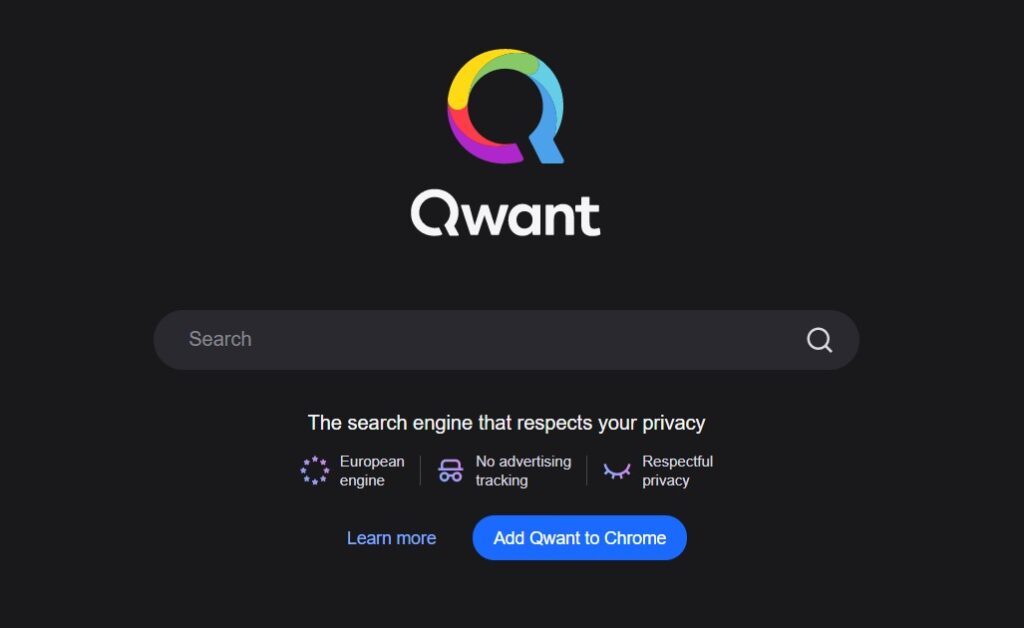
This French engine was launched in the July of 2013, and ever since, it has been focusing on easing search and discovery while protecting its users’ privacy. Alongside immense respect for privacy, the platform offers various other benefits including panoramic search (this means that Qwant will produce results from the entire web, including websites, videos, images, social networks, music, and shopping) and neutral results (the results will be displayed without any sort of partiality or discrimination).
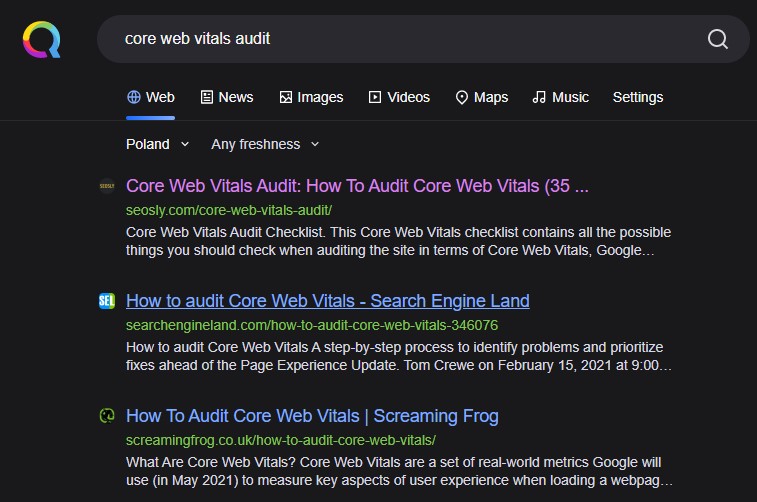
17. Wiki.com
Link: wiki.com (it still loads over HTTP)
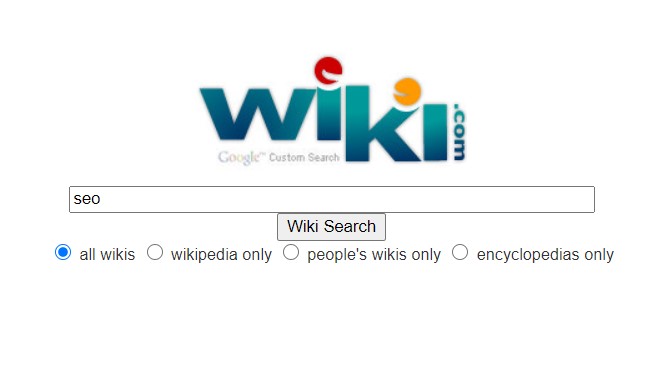
Wikipedia was initiated in 2001, and since then, has been the internet’s most popular encyclopedia. One of the tools that come under Wikipedia is Wiki, designed specifically for students and allows them to modify or contribute to materials related to courses and academics. Wiki’s collaborative nature means that it encourages the development of a community within courses. Wiki is basically a webpage that offers an open-editing platform.
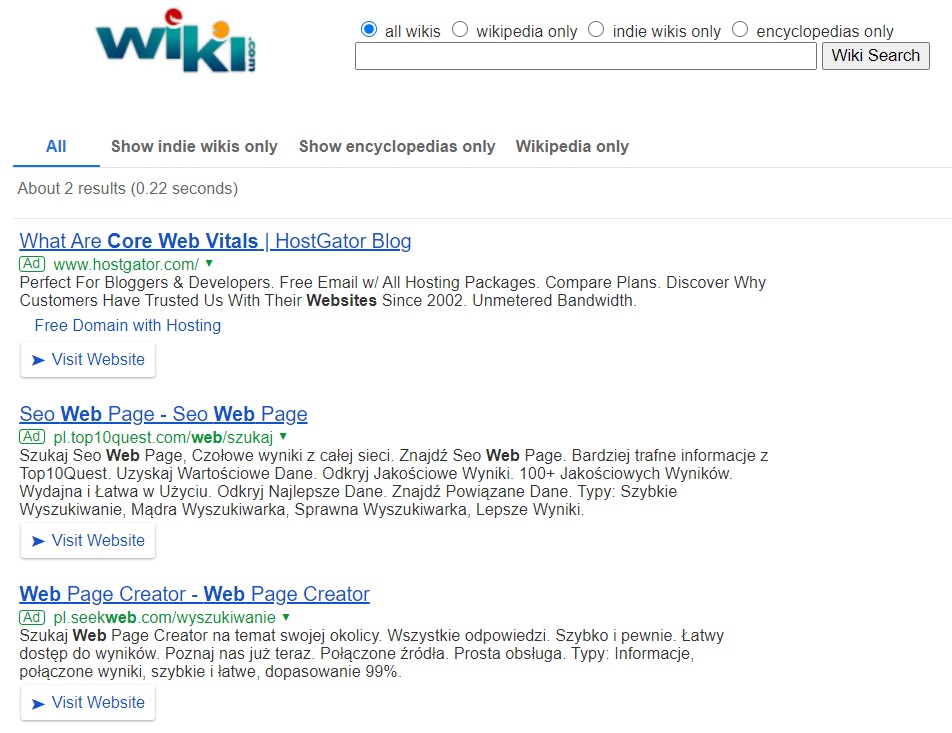
18. Ecosia
Link: Ecosia
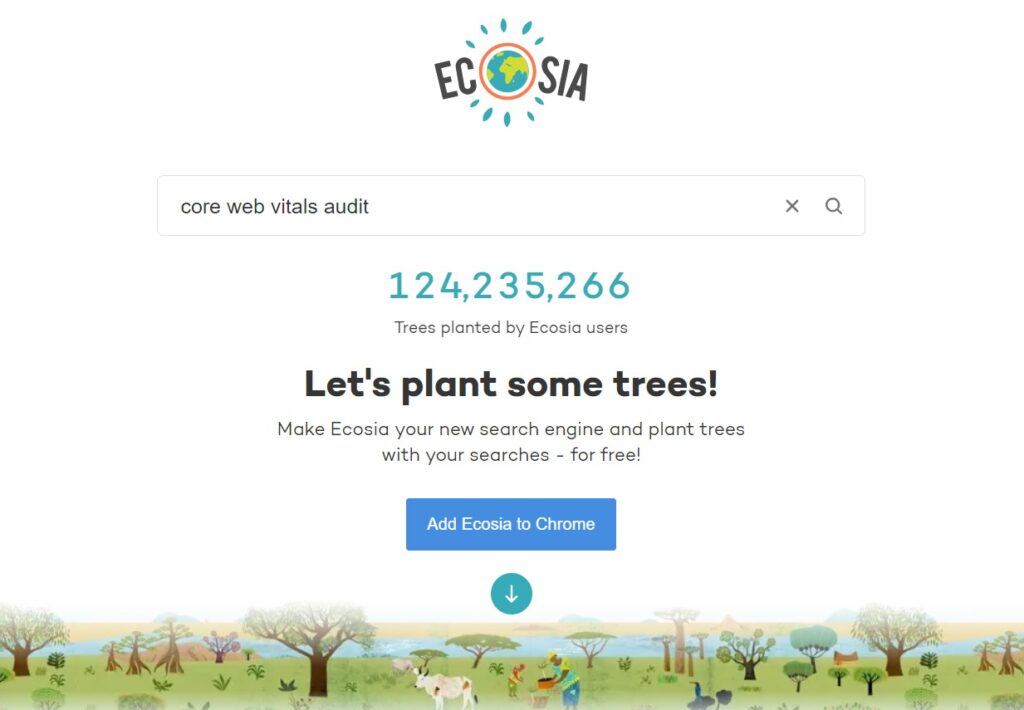
Ever heard of a search engine that plants trees? Or, more specifically, a search engine that allows you to plant trees? Well, now you have. 80% of the ad revenue generated during browsing is used by Ecosia to plant more trees around the world while focusing on regions where trees are most needed.
Moreover, the server operates on 200% renewable energy, and with every search, 1 KG of carbon dioxide is removed from the atmosphere. Also, the search engine does not store any user data or include any third-party trackers. It also anonymizes every search after a week from when it was made.
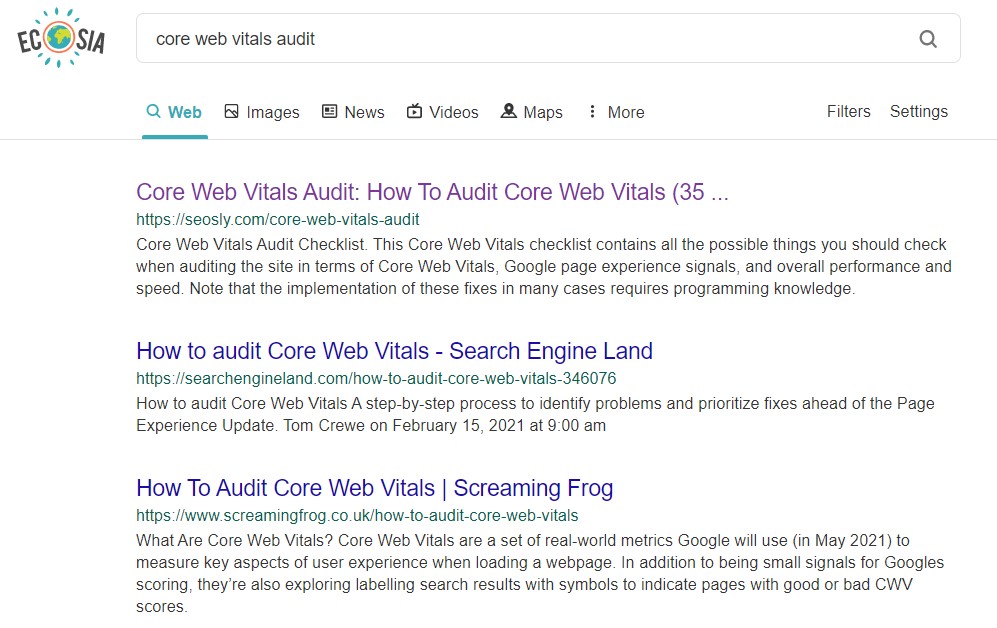
19. Ekoru Search Engine
Link: Ekoru
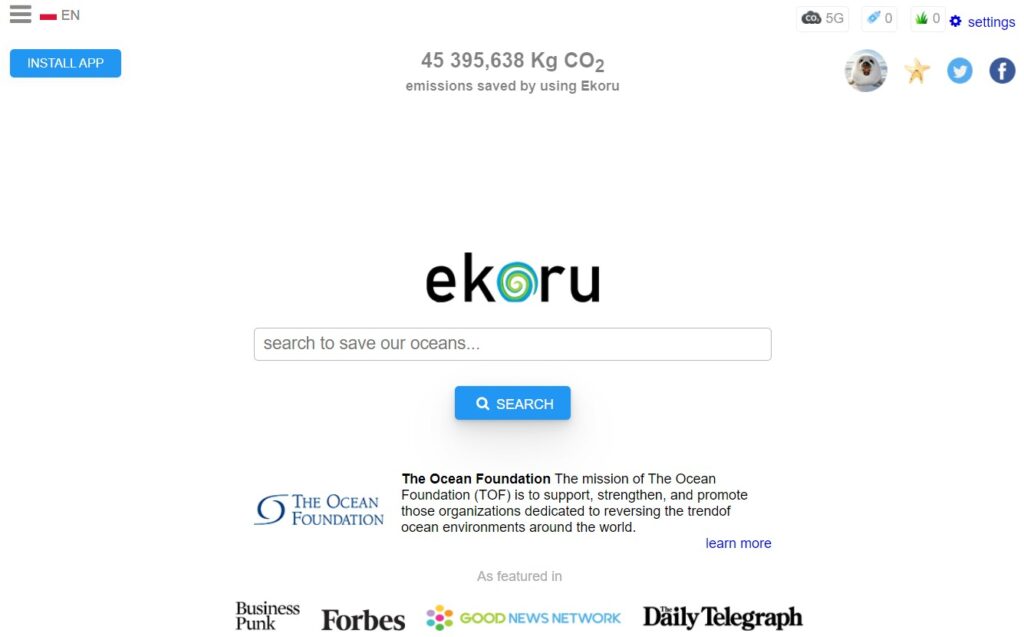
Just like Ecosia, Ekoru also tries to make the world a more habitable place by cleaning and reforesting the oceans. With every search that you make, you are helping remove plastic from the oceans and reforesting them through the seagrass.
Every search is driven through hydroelectricity and is therefore environmentally friendly. Ekoru allocates 60% of its profits to its partner charities like Operation Posidonia and Big Blue Ocean Cleanup – both of which work on ocean cleanup and reforestation.

20. Wayback Machine
Link: Wayback Machine
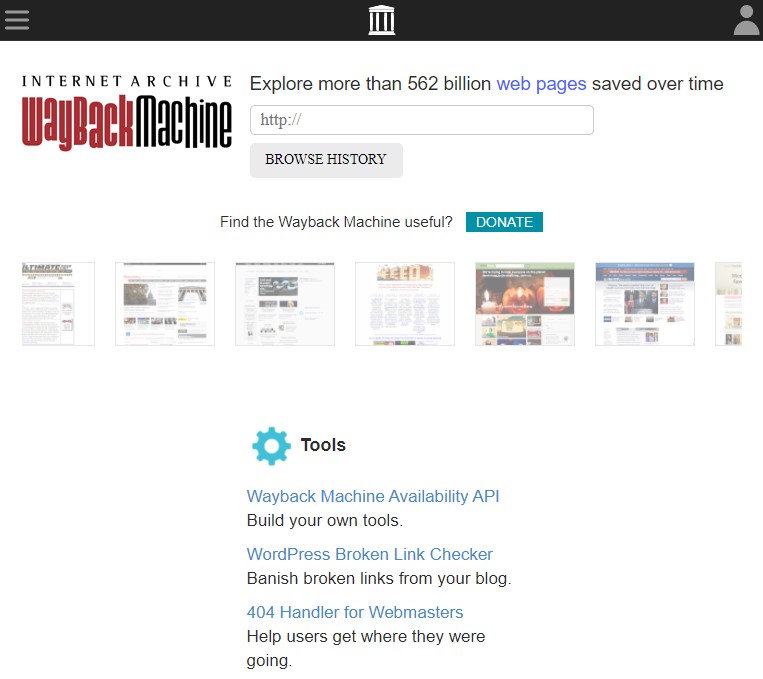
The Wayback Machine was initiated by the Internet Archive and helps users explore the archived sections of websites. All that a visitor needs to do is enter a URL, choose the date range, and start surfing through an archived web version.
Also, since the Wayback Machine also performs source code indexation, users can even go through and retrieve codes from prior pages.

21. GIPHY
Link: Giphy
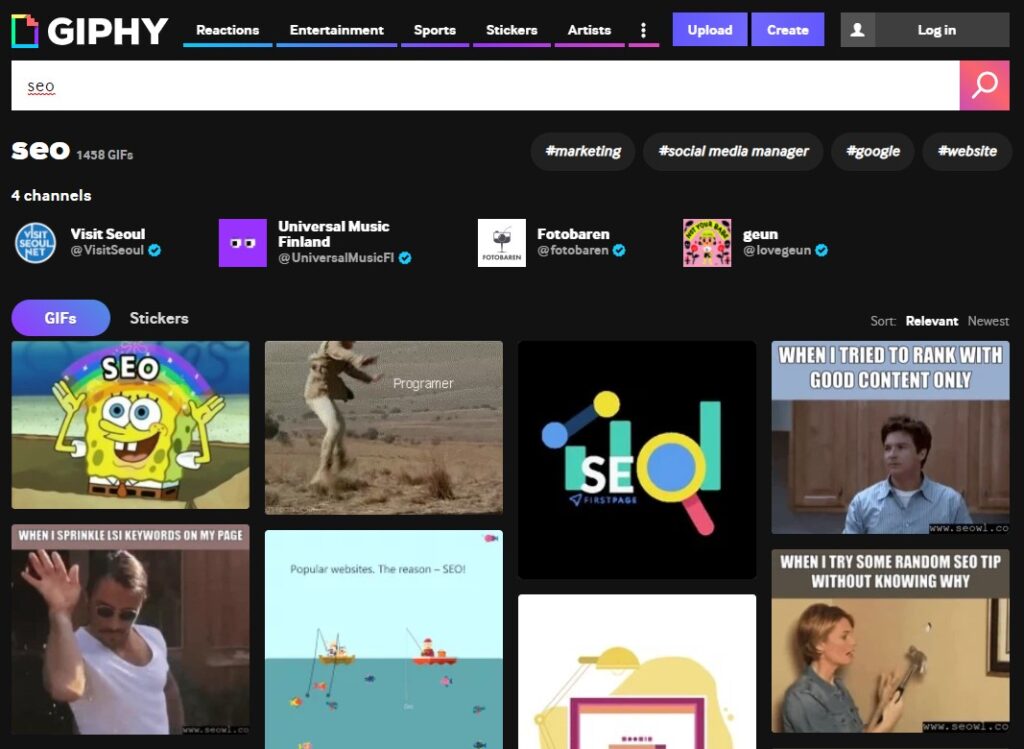
This online American database is one of the most preferred choices for searching and sharing briefly, looping videos that contain no sound and have a resemblance to GIF files. You can share these simple and free videos to platforms such as Facebook, Instagram, Twitter, Reddit, Tumbler, and Pinterest, and send them through emails or text messages. At the moment, GIPHY serves over 10 billion users on a daily basis.

22. Listen Notes
Link: Listen Notes
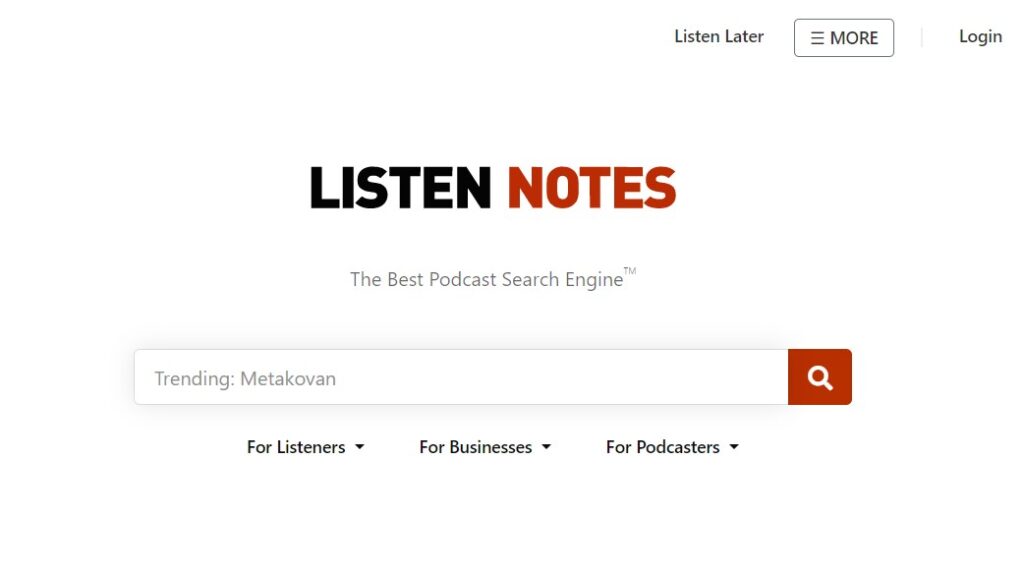
Listen Notes is perhaps the most complete podcast database you will find on the internet. You can use the platform’s website called ListenNotes.com, the Listen API interface which you can integrate into a website or an app for accessing the podcast database, and even use the spreadsheet interface to export metadata for the podcast in SQLite or CSV formats.
Listen Notes is in no way associated with large companies like Google, Apple, Amazon, or Spotify, as these platforms primarily focus on application experience rather than on the overall user experience.
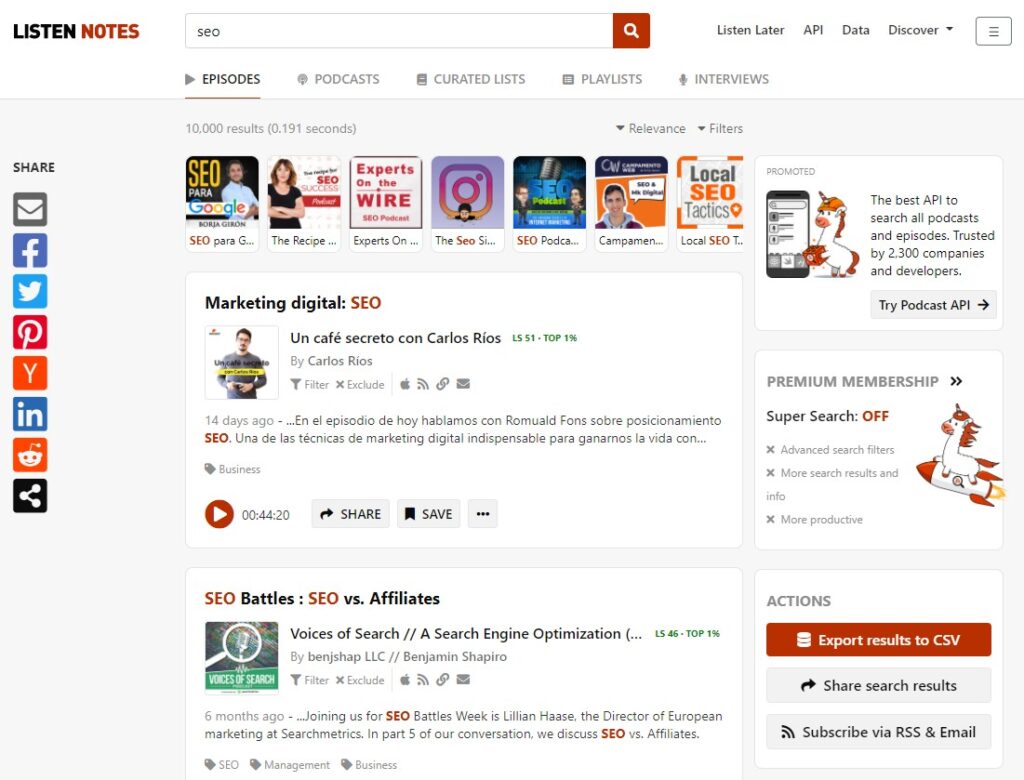
23. Ask Search
Link: Ask.com

The search engine Ask.com is commonly known as Ask and lets users shape their searches in the form of questions and thereby producing more relevant results. Despite stiff competition from Google, Yahoo, and Bing, Ask.com remains a highly popular website for internet users. You can even set Ask as your default search engine, and even as new tabs and homepage pages.
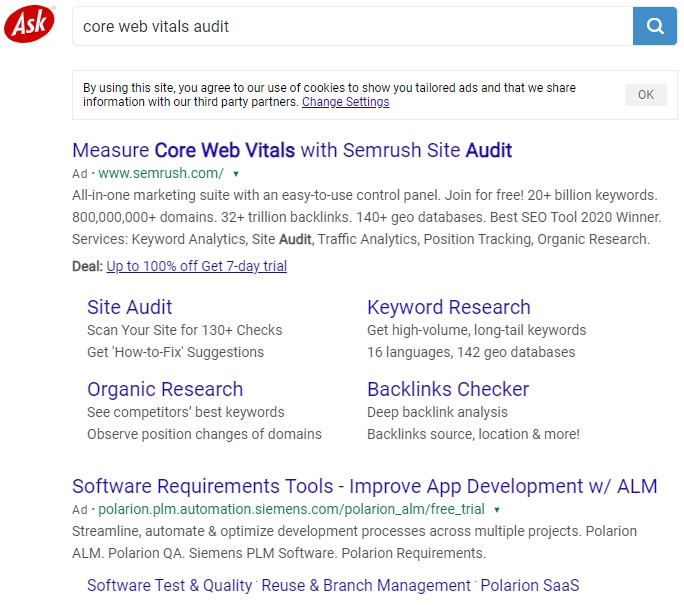
24. Dogpile
Link: Dogpile
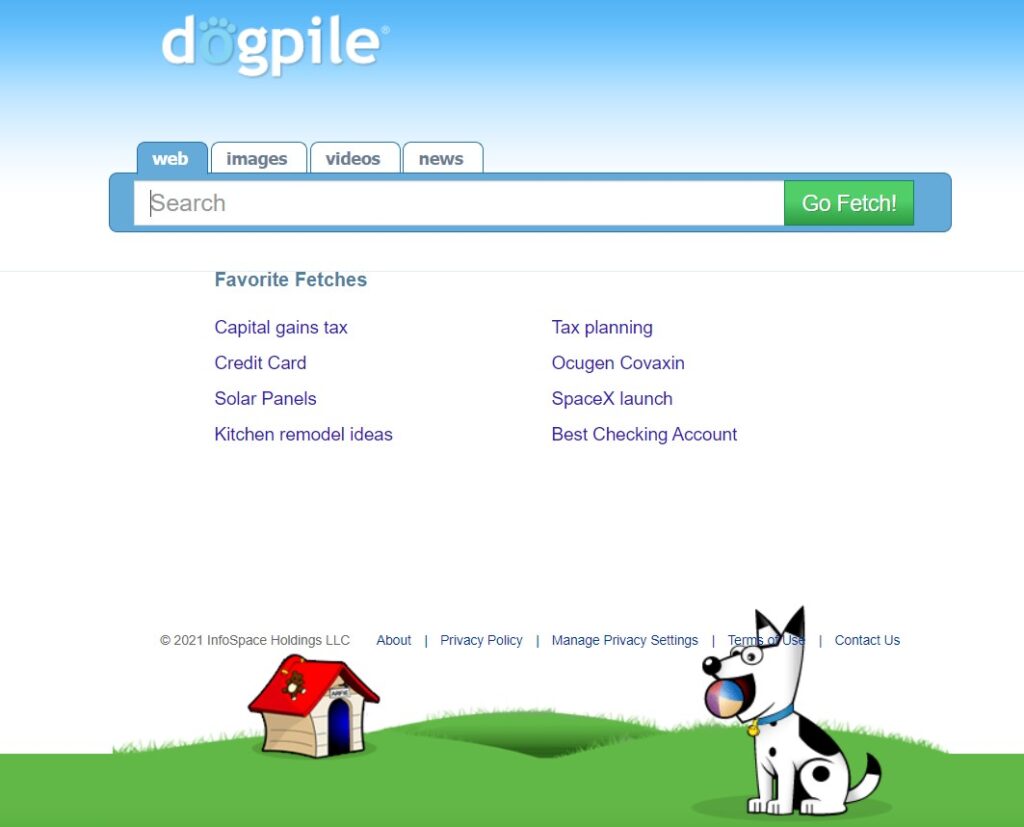
What makes Dogpile metasearch engine unique is its ability to go through a number of search engines simultaneously and deliver quite comprehensive results. Moreover, you can benefit from the platform’s suggestions related to the search query and use those suggestions to improve the output of your searches (just like with Google). Furthermore, every time you perform a search, Dogpile will donate a portion of its earnings for the betterment of needy animals.
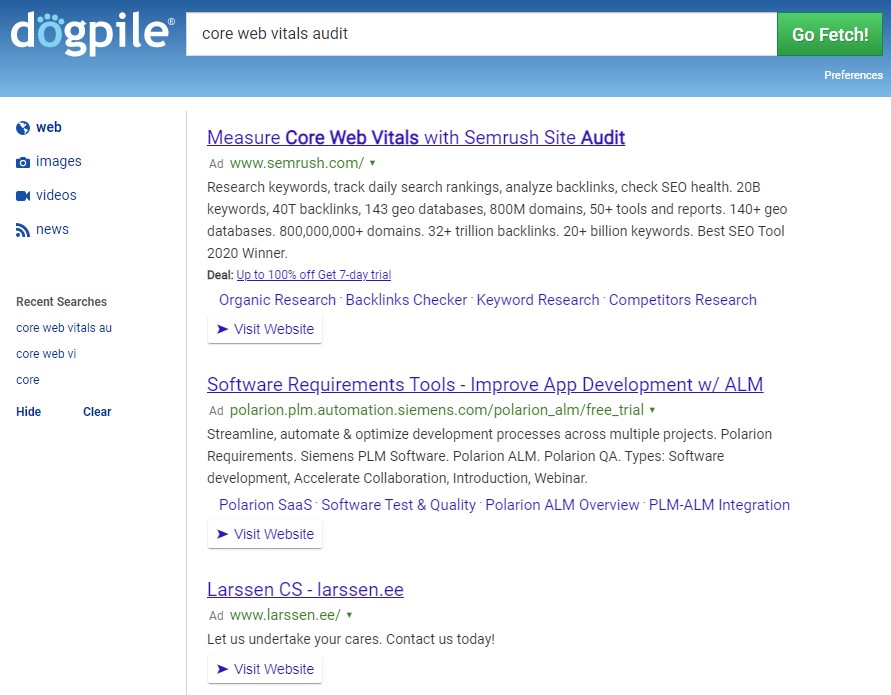
25. Wolfram Alpha
Link: WolframAlpha
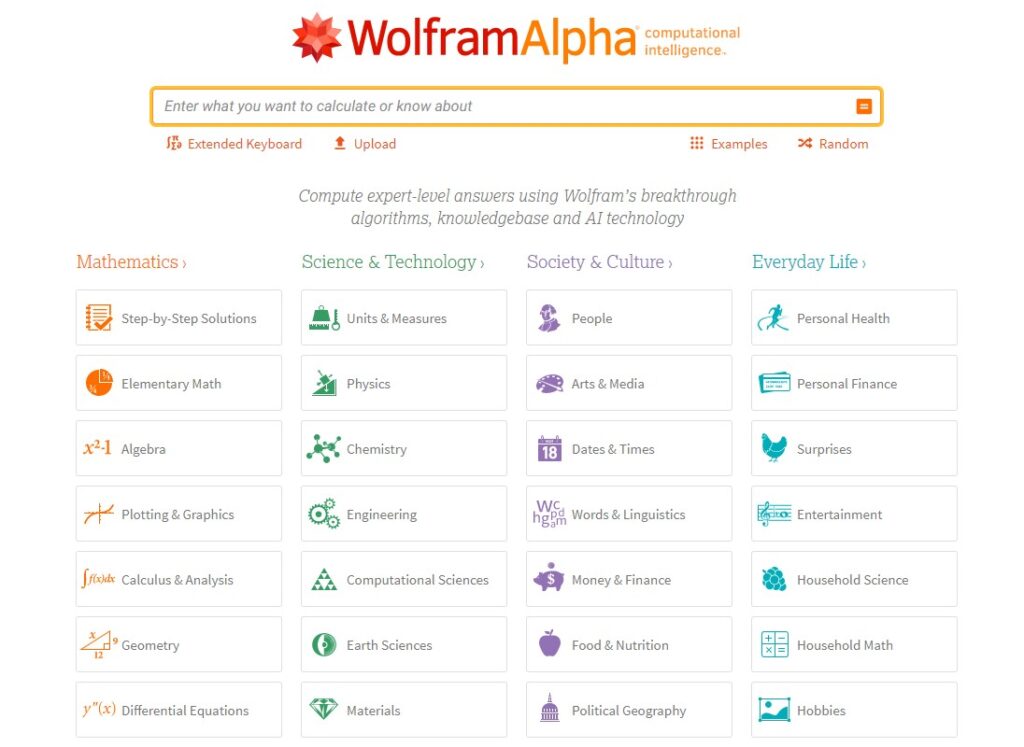
Wolfram Alpha is a unique kind of search engine that is used to obtain knowledge and compute answers. The search engine contains large stores of expert knowledge, and its algorithms use this knowledge to come up with answers, perform analysis, and produce reports. Since Wolfram Alpha only uses the most reliable sources of data, it is safe to assume that the results produced by Wolfram are almost always correct.
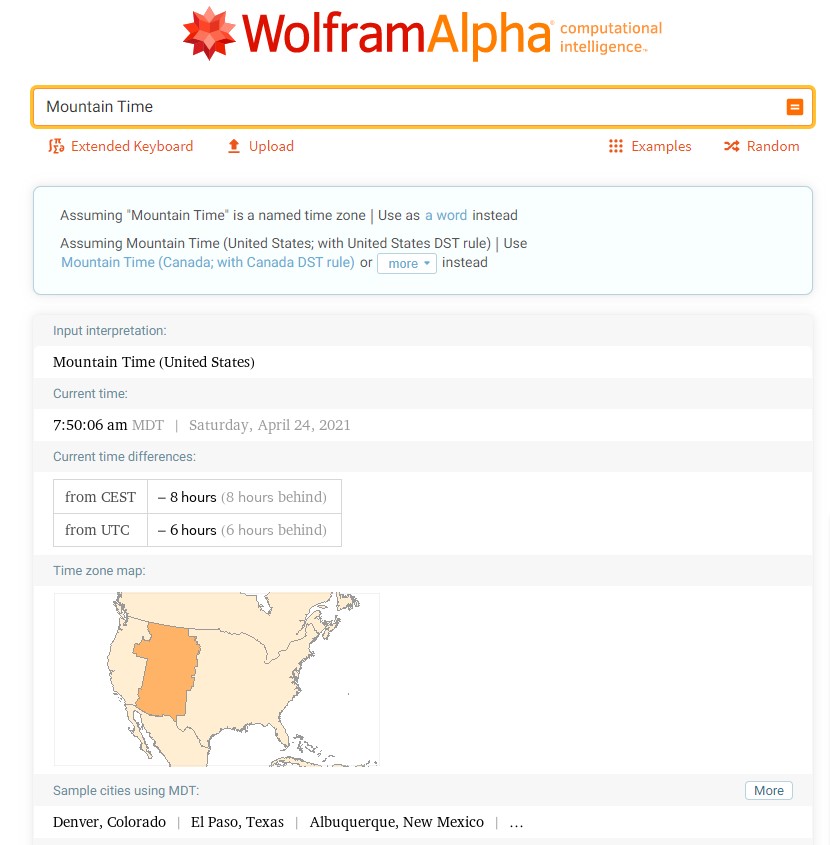
26. Yep
Link: Yep

Yep is a recently launched search engine with a very interesting concept and mission behind it. The goal behind this alternative search engine is to support good content by giving 90% of revenue to content creators. Yep was created by the Ahrefs team.
As Yep states on their website “We offer an unbiased, private search experience that rewards and compensates the makers behind the content. To do this, we use a 90/10 profit share business model where we pay 90% of advertising profits directly to these makers.”
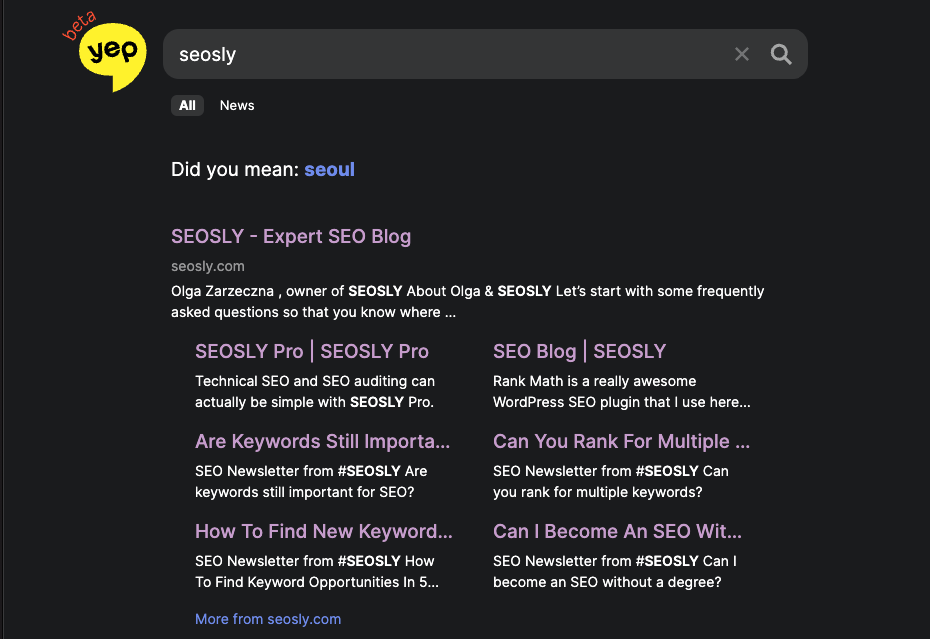
Frequently asked questions about alternative search engines
Here are the most often asked questions about other search engines.
What are some popular alternative search engines?
Bing, DuckDuckGo, Startpage, Ecosia, Baidu, Yandex, Swisscows, Qwant, and Searx are some popular alternatives.
Which alternative search engines prioritize user privacy?
DuckDuckGo, Startpage, Swisscows, Qwant, and Searx are known for prioritizing user privacy by not tracking users or personalizing search results based on user data.
Which search engine is the most popular after Google?
Bing, owned by Microsoft, is the second most popular search engine after Google.
Are there environmentally friendly search engines?
Yes, Ecosia is a search engine that uses its ad revenue to plant trees, making it an environmentally friendly option.
Which other search engines are best for non-English content?
Baidu is the most popular search engine in China and Yandex is the most used search engine in Russia. Both are good for content in their respective languages.
Do other search engines use Google’s search technology?
Yes, some search engines like Startpage use Google’s search technology but remove all tracking and personalization to protect user privacy.
Are there open-source alternative search engines?
Yes, Searx is an example of an open-source search engine.
Can I get different search results from alternative search engines?
Yes, different search engines use different algorithms and databases, which can lead to different search results.
Are there search engines that don’t show ads?
Most search engines are ad-supported to provide free services, but some, like Searx, have minimal advertising.
Which alternative search engines are best for academic research?
While Google Scholar is popular for academic research, other engines like Microsoft Academic (a part of Bing) can also be useful.
Do all search engines track my searches?
No, privacy-focused search engines like DuckDuckGo, Startpage, Swisscows, Qwant, and Searx do not track your searches.
Can I use these alternative search engines on my smartphone?
Yes, most of these search engines have mobile-friendly websites or apps that can be used on smartphones.
Do alternative search engines offer image and video search like Google?
Yes, most popular search engines like Bing, DuckDuckGo, and Yandex offer image and video search features.
Are there search engines specifically for kids?
Yes, there are search engines like KidzSearch and Kiddle that provide a safe search environment for kids.
What is a meta search engine?
A meta search engine, like Searx, is a search engine that aggregates results from multiple other search engines.
What makes Bing different from Google?
Bing is Microsoft’s search engine and it powers Yahoo’s search. Bing’s image search is often considered superior to Google’s. Also, it provides different features like rewards for searches.
Why is DuckDuckGo known for privacy?
DuckDuckGo doesn’t track its users or personalize search results based on previous behavior, which makes it a popular choice among privacy-conscious users.
What’s unique about Startpage’s use of Google technology?
Startpage uses Google’s search technology but removes all tracking and personalization. This allows users to benefit from Google’s search capabilities while maintaining their privacy.
Why is Baidu popular in China?
Baidu is the most widely used search engine in China and it’s known for its Chinese language search capabilities. It also provides various services like maps, news, videos, and more.
What’s unique about Qwant?
Qwant is a privacy-centric search engine based in France. It doesn’t record your searches or use your personal data for advertising.
Does Bing have any academic research capabilities like Google Scholar?
Yes, Microsoft Academic is a service by Microsoft (the company behind Bing) that provides academic search capabilities.
Know other alternative search engines that are not listed here?
Let me know if yo think that some other search engines are missing on this list. I will be happy to update it. Thanks!
